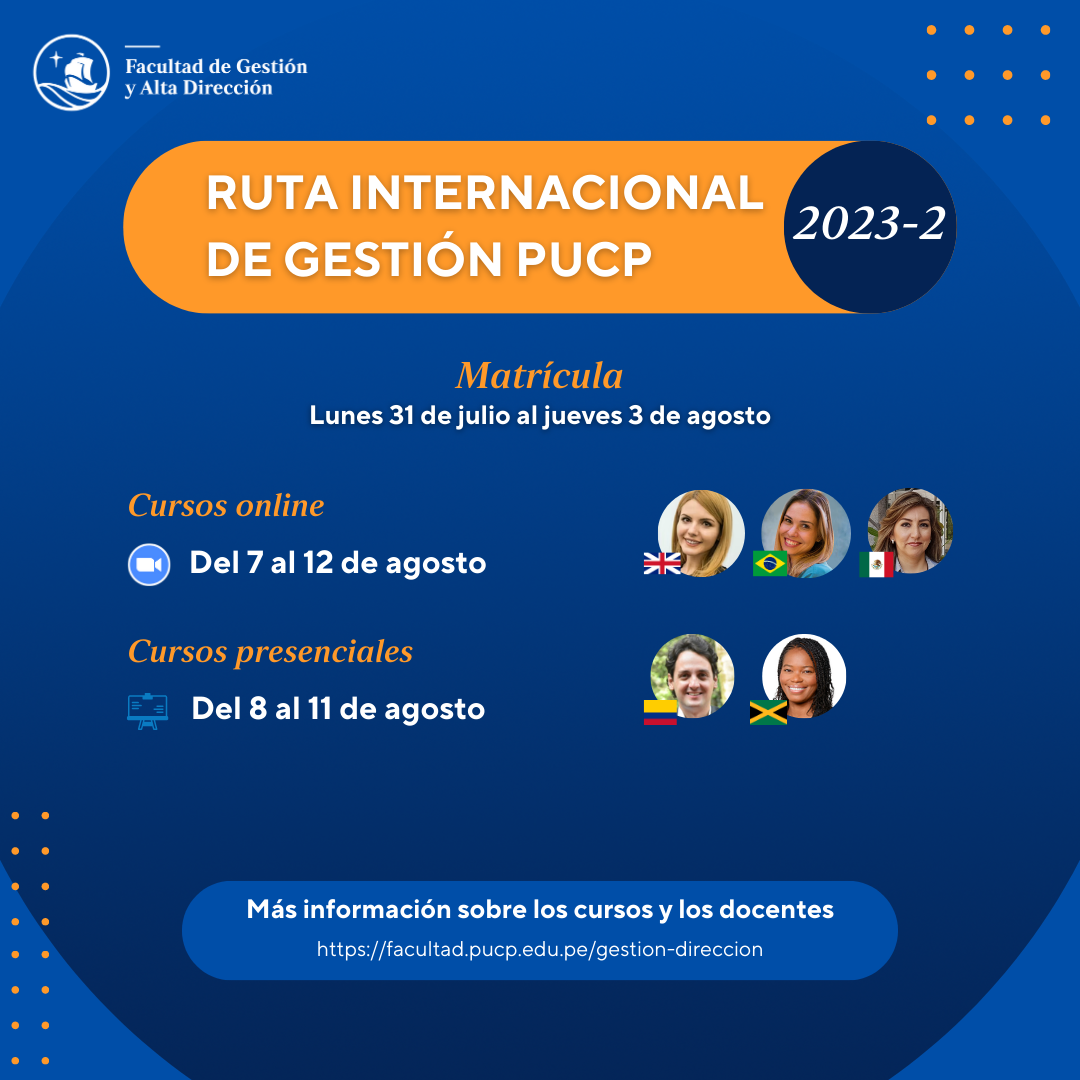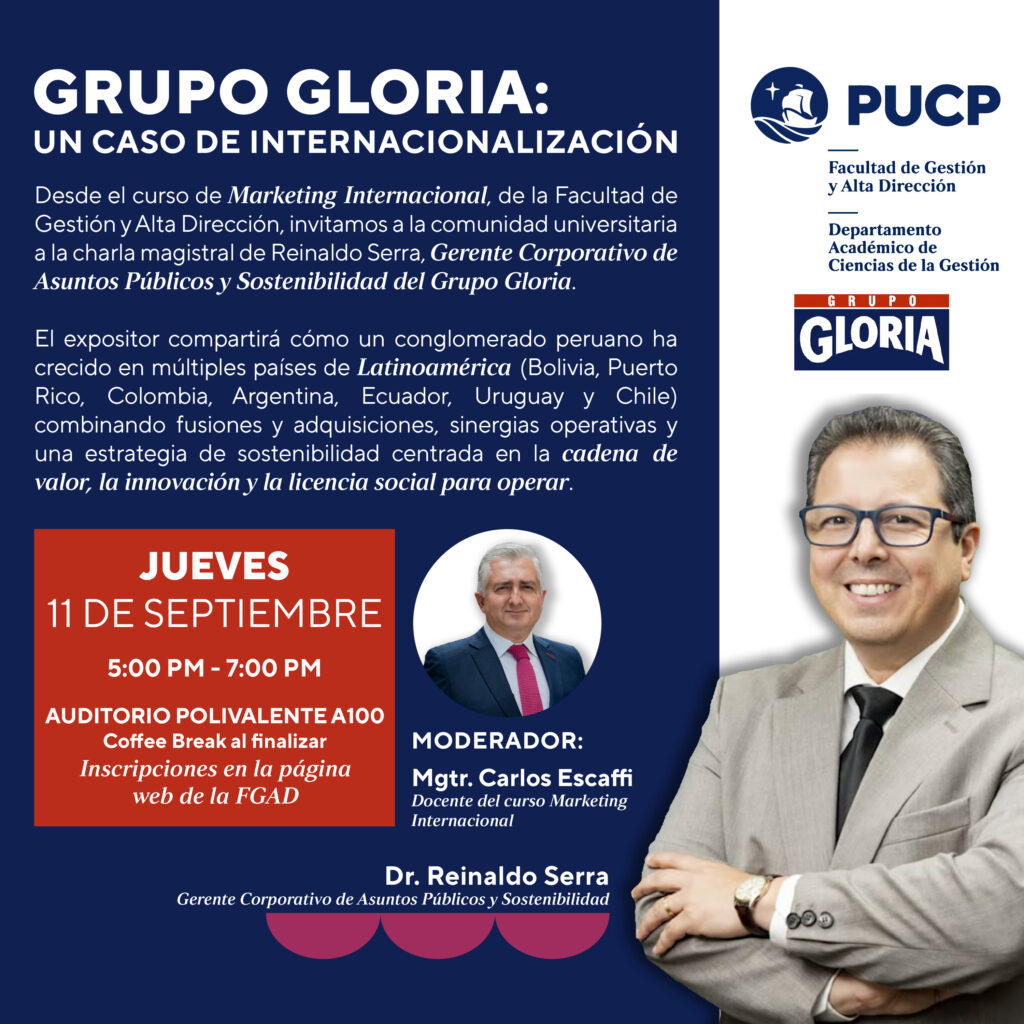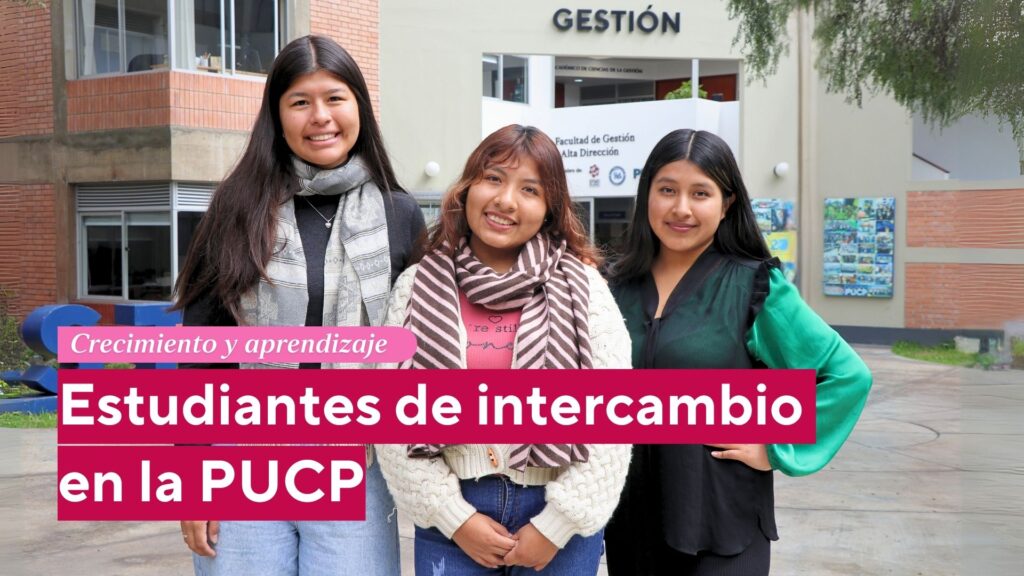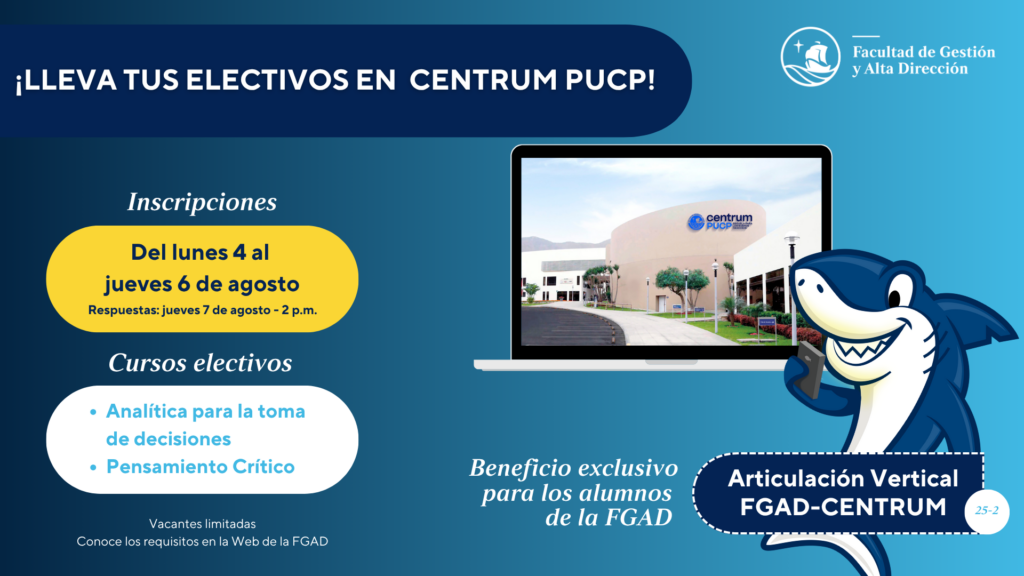En el semestre 2023-2 se dictarán los siguientes cursos internacionales en modalidad online y presencial, enfocados en temas de Gestión:
1.Social Marketing
(Curso online en inglés)
Código y Horario
1GES78 – SEMINARIO INTERNACIONAL DE GESTIÓN 18
Del lunes 7 al sábado 12 de agosto – 9:00 a 11:40 a.m.
Docente: Tana Licsandru
Dr Tana Licsandru is Lecturer (Assistant Professor) in Marketing at Queen Mary University of London, UK and a Fellow of the Higher Education Academy. She holds a PhD in Marketing from the University of Manchester UK. Throughout her academic career, Tana has gained extensive teaching experience at undergraduate and postgraduate level. She has led and taught multiple courses including Social and Political Marketing, Digital Marketing, Global Marketing and Advertising, International Brand Management and Professional Analytics, for cohorts of up to 400 students from culturally diverse backgrounds. Tana’s research has been published in Journal of Public Policy and Marketing, Journal of the Association for Consumer Research, Journal of Business Research, International Marketing Review, and Industrial Marketing Management, and presented at numerous international conferences.
Sumilla del curso
The Social Marketing module provides students with an introduction to the added value of marketing to address some of the world’s most pressing social problems through engendering behavioural change for social good. Students will learn how to utilise tools and concepts developed from the commercial marketing literature to facilitate behavioural change amongst relevant stakeholders in order to improve the general well-being of individuals and society. We will draw on Kotler and Lee (2019) 10 step social marketing planning model to analyse, evaluate and design social marketing campaigns. The module is packed with case studies and examples from around the world and students are encouraged to bring their own experiences, knowledge and examples into the virtual classroom.
2. International Negotiations
(Curso online en inglés)
Código y Horario
1GES79 – SEMINARIO INTERNACIONAL DE GESTIÓN 19
Del lunes 7 al sábado 12 de agosto – 2:00 – 4:40 pm.
Docente: Clarice Kogut
Full time professor of strategy and International Business at IAG/ PUC-RIO, PhD in Management from the Federal University of Rio de Janeiro / COPPEAD (2018), master’s in business administration from Columbia University (2006), CFA (2004), and bachelor’s in business from Fundação Getulio Vargas (EAESP-FGV) (2001). Program coordinator of PEIEX, an export training program for small and medium enterprises of Rio de Janeiro in association in APEX (The Brazilian Trade and Investment Promotion Agency). Research interests in the areas of International Business and Strategy, and executive/consulting experience of over 20 years in Strategic Planning, Marketing and Management.
Sumilla del curso
The objective of this course is to present to students the main concepts and strategies of business negotiations, as well as to offer exercises applied to a global reality. The course is designed to stimulate curiosity about management practices as well as to develop new skills.
The course is based on active learning methodologies, with discussions based on teaching case and negotiation practices, supported by the prior reading of carefully selected academic texts.
3. Contextos globales: el impacto de los ambientes sociales, políticos y económicos en los asuntos internacionales de los países
(Curso online en español)
Código y Horario
1GES01 – SEMINARIO INTERNACIONAL DE GESTIÓN 1
Del lunes 7 al sábado 12 de agosto – 6:00 – 8:40 p.m.
Docente: Karla María Nava Aguirre
Doctora en Ciencias Administrativas, Global MBA para Gerentes Latinoamericanos de Thunderbird School of Global Management y Licenciada en Estudios Internacionales de la Universidad de Monterrey (UDEM). La Dra. Nava lleva más de 20 años trabajando en el sector académico. Desde 2017, Karla es profesora titular, investigadora y Directora del Programa de Negocios Globales de la Escuela de Negocios UDEM en México. La Dra. Nava es la Directora de País de México en la Junta Ejecutiva de la Academia de Negocios Internacionales (AIB-LAC) 2021-2024. Karla participa en proyectos internacionales, conferencias, artículos publicados y capítulos de libros. Miembro del Sistema Nacional de Investigadores (SNI) del CONACYT en México. Premio a la Internacionalización de la Educación Superior UDEM 2021 y 2022.
Sumilla del curso
A partir de un análisis del escenario internacional, el alumno desarrollará las competencias para reflexionar, sintetizar y argumentar desde una perspectiva multidisciplinaria eventos recientes de alcance global. Se pretende que el alumno fortalezca su capacidad de interés en asuntos internacionales de impacto en el entorno nacional, regional y local.
CURSOS PRESENCIALES
4. Diaspora Entrepreneurship: Theories, Concepts, Experiences and Implications for Developing Countries
(Curso presencial en inglés)
Código y Horario
1GES72 – SEMINARIO INTERNACIONAL DE GESTIÓN 14
Del martes 8 al viernes 11 de marzo de 8:00 – 12:00
Docente: Indianna Minto-Coy
Deputy Executive Director, MBA and MSc Programmes, Mona School of Business and Management, The University of the West Indies, Mona. She is the Caribbean Countries Director for the Academy of International Business – Latin America and the Caribbean (AIB-LAC) for 2021-2024. She is also a Research Affiliate at Wilfrid Laurier University’s International Migration Research Centre. Indianna’s research, consultancies, publications and public engagements span the themes of Entrepreneurship, Diasporas and International Business. There is also an emerging stream of work in the areas of Sustainability, Business Continuity and Disaster Risk Reduction.
Sumilla del curso
Migration has been a constant feature of human existence. Nevertheless, modern history has seen increased attention to migration and the resulting creation of a significant diaspora population globally. This seminar delves into the theme of diasporas and migration, tracing the historical and theoretical background and emergence of the topic, leading into practical business and policy implications. Migration and diaspora studies have their root in sociological and political studies, making the discussion accessible to a multidisciplinary audience. At the same time, the approach will be to situate the discussion in the field of business and management. In particular, emphasis will be placed on the concepts of diaspora business and diaspora entrepreneurship and the implications for business and society in developing and emerging contexts.
5. Reputación e interculturalidad en entornos turbulentos
(Curso presencial en español)
Código y Horario
«1GES65 – SEMINARIO INTERNACIONAL DE GESTIÓN 7»
Del martes 8 al viernes 11 de marzo – 6:00 – 10:00 p.m.
Docente: Juan Velez-Ocampo
Juan Velez-Ocampo (PhD), Profesor Asociado y Director del Doctorado en Admnistración y Organizaciones de la Universidad de Antioquia, Colombia. Es Vicepresidente de promoción de Iberoamerican Academy of Management y Director para Colombia de Academy of International Business Latin American and the Caribbean (AIB-LAC). Su experiencia profesional e intereses académicos incluyen la reputación, sostenibilidad e internacionalización de compañías de países emergentes. Sus investigaciones han sido publicadas en revistas académicas como European Business Review, Journal of Knowledge Management, European Management Review, Cross Cultural and Strategic Management, y Management and Organization Review, entre otras.
Sumilla del curso
En contextos inciertos, impredecibles y cambiantes, un inadecuado manejo de las relaciones con grupos de interés puede afectar la reputación de las compañías y sus líderes. Los beneficios de la reputación positiva generalmente se asocian a la influencia que las organizaciones y las personas pueden ejercer sobre los grupos de interés con los que se relacionan. Más específicamente, una reputación positiva tiene efectos en asuntos como la intención de compra, la atracción de talento, el compromiso de los empleados y las facilidades de acceso a capital, lo que contribuye con el desempeño financiero de las empresas. Sin embargo, cuando se opera en entornos interculturales en los que hay diversidad, e incluso conflicto, en valores, prioridades y supuestos, la relaciones con los grupos de interés se pueden complejizar y generar afectaciones en la reputación. De ahí, que la comprensión de las diferencias culturales y de las expectativas de grupos de interés interculturales con diferentes niveles de poder, legitimidad y urgencia sean clave para diferenciarse y generar valor.



